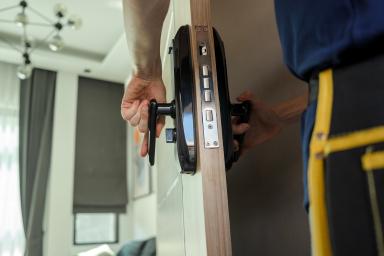How to become a plumber
Working as a plumber can be a satisfying career if you enjoy working with your hands, solving problems, and helping people maintain their homes.
It can also be rewarding if you enjoy precision, as accurate measurements and careful installations are crucial for plumbing systems to work correctly and efficiently.
Additionally, plumbing can provide job stability since there is generally a demand for skilled tradespeople, and it could offer good earning potential for a sole trader or limited company.
The annual salary for a plumber in the UK ranges from a starting point of around £21,000 to £40,000 for experienced plumbers, although salaries can vary based on location, experience, and specialisation.
There is currently a shortage of plumbers and other skilled tradespeople, so now could be a good time to learn how to become a plumber.
What does a self-employed plumber do?
A self-employed plumber installs, repairs, and maintains plumbing systems.
Running your own business means you can decide when you work, which projects you take on, and how much you charge.
Plumbers handle various tasks, meaning they can work on many projects for different types of customers.
Their tasks might include:
- fixing leaks, unclogging drains, and installing pipes
- repairing household toilets and sinks
- working on large projects in places like office buildings or shopping centres
- installing plumbing in new homes or commercial buildings
- specialising in central heating systems, including repairing or installing radiators and boilers
- installing eco-friendly systems, such as heat pumps and water-saving systems.
Can I retrain as a plumber?
Yes – you can retrain as a plumber at any age.
Many training programs and apprenticeships welcome mature students.
Lessons learned from previous careers could mean you’re already equipped with valuable experience.
These might include problem-solving and customer service skills.
How to become a plumber
There are several routes to becoming a self-employed plumber.
How long it takes depends on the route you choose.
Complete a traditional apprenticeship
In the UK, many people choose to become plumbers by doing a traditional apprenticeship.
This route typically takes 3 to 4 years to complete.
A plumbing apprenticeship combines hands-on work with classroom learning – you work under the supervision of experienced plumbers while also attending college part-time.
The main advantage is that you gain practical experience alongside theoretical knowledge, all while getting paid.
However, it requires a few years of commitment, and the pay is lower at first than that of fully qualified plumbers.
For more information, you can explore the UK Government Apprenticeships website.
Completing a fast-track plumbing course
Fast-track plumbing courses could be ideal for those looking to switch careers quickly.
These courses offer intensive training and are much shorter than traditional apprenticeships, lasting from four weeks to several months.
Fast-track courses typically cover the NVQ Level 2 or 3 Diploma in Plumbing and Heating.
The courses are intensive – and you are more likely to get stuck into hands-on tasks quickly rather than first spending time observing a qualified plumber.
Depending on your area of interest, you may need specific qualifications, particularly if you plan to work with gas or central heating systems.
For instance, to work on gas appliances legally, you must become Gas Safe registered.
Fast-track courses offer a faster way to becoming a self-employed plumber than a traditional apprenticeship, but they can be expensive.
To find a reputable course that will include everything you need, you may want to look for accredited providers like City & Guilds.
Working as a plumber’s mate
Starting as a plumber’s mate could be another viable way into the plumbing industry.
In this role, you assist a qualified plumber with various tasks, gaining valuable on-the-job experience and learning about the daily operations and challenges of plumbing.
Working as a plumber’s mate could help you learn practical plumbing skills and help you decide whether you want to pursue further qualifications.
It can also be a good way to build a network within the industry, which may help with future job opportunities.
Do I need work experience to become a self-employed plumber?
Because plumbing is a hands-on trade, gaining as much practical experience as possible is best, regardless of qualification route.
Practical experience could help you build confidence and competency in handling various plumbing tasks.
It can help complement formal training, meaning you are well-prepared for any plumbing challenge.
You may want to consider joining professional bodies such as the Chartered Institute of Plumbing and Heating Engineering (CIPHE) for access to resources and support.
Why start your own plumbing business?
Starting your own plumbing business could bring several advantages.
A key benefit is setting your hours, which could allow you to find a better work-life balance and offer emergency plumbing services.
You can also choose the jobs you prefer, focusing on projects that match your skills and interests.
This means that, depending on demand, you could potentially specialise in a particular area, such as domestic or commercial plumbing.
Running your own business allows you to shape your career path and build a business that reflects your expertise and personal preferences.
For example, some plumbers decide to expand their services and diversify into retail, selling plumbing fittings and supplies.
How to become a self-employed plumber
Here are some key steps to consider:
1. Create a business plan
The first step in becoming a self-employed plumber is to create a detailed business plan.
This plan should outline your business goals, target market, financial projections and how you plan to achieve your goals within a given timeframe.
An effective business plan could help guide your business decisions and secure financing.
Download our free business plan template.
2. Secure financing
Securing the proper funding could make getting your plumbing business off the ground much easier.
You could consider several funding options – from personal savings to borrowing from friends and family or applying for a self-employed loan.
You might also consider a Start Up Loan, a government-backed personal loan for business purposes of up to £25,000 with a fixed interest rate of 6%.
Think about your options before applying to decide the best type of funding for your business.
Before deciding on any financial product though, it’s a good idea to seek independent specialist financial advice to make sure the product is right for you and your circumstances.
3. Conduct market and customer research
Understanding your target market can be key to business success.
Consider conducting market research to identify potential customers and understand the demand for plumbing services in your area.
This could help you decide which services to offer, who to target, how to specialise, and what prices to charge.
Discover our tips on market research techniques.
4. Register your business
Registering your business with HRMC is an important step for Self-Assessment tax purposes.
This is how you will pay income tax on the profits you make.
If you plan to operate as a limited company, you must choose a business name and register with Companies House.
5. Get insurance
Consider the types of business insurance you need to protect yourself and your new plumbing business, especially if you work in people’s homes or private places.
You may want to consider public liability insurance, professional indemnity insurance, and tools insurance to cover your equipment in the event of any accidents, damage, or theft.
Read our guide to self-employed insurance for start-up businesses.
6. Organise accounting and bookkeeping
Efficient accounting and bookkeeping can be essential for your start-up’s financial success.
If you don’t have a head for numbers or want to maximise your time, you could hire an accountant to help you manage your start-up’s finances.
Alternatively, you might use accounting software to track your business income and expenses.
Learn our small business bookkeeping tips for success.
7. Buy tools and equipment
To provide the best service, consider whether you need to invest in high-quality plumbing tools or a reliable van to visit customers.
You can look at cost-effective ways to do this, particularly at the beginning of your self-employment journey.
Consider buying second-hand tools or leasing equipment to help you manage costs.
8. Market your business
Effective marketing can be key to attracting clients and building a strong reputation.
There are several things you could do to promote your plumbing business.
Think about creating a professional website and using social media to help you reach potential customers.
You could also register your business on a directory such as Checkatrade.
Rated People is a similar platform and helps to connect tradespeople with potential customers.
You might also consider networking with local businesses and joining trade associations to help boost your start-up’s visibility.
Offering promotions or discounts might help you attract new clients and encourage word-of-mouth referrals.
For more ideas, read our Essential guide to marketing.
Learn with Start Up Loans and help get your business off the ground
Thinking of starting a business? Check out our free online courses in partnership with the Open University on being an entrepreneur.
Our free Learn with Start Up Loans courses include:
- Entrepreneurship – from ideas to reality
- First steps in innovation and entrepreneurship
- Entrepreneurial impressions – reflection
Plus free courses on climate and sustainability, teamwork, entrepreneurship, mental health and wellbeing.
Disclaimer: The Start -Up Loans Company makes reasonable efforts to keep the content of this article up to date, but we do not guarantee or warrant (implied or otherwise) that it is current, accurate or complete. This article is intended for general information purposes only and does not constitute advice of any kind, including legal, financial, tax or other professional advice. You should always seek professional or specialist advice or support before doing anything on the basis of the content of this article.
The Start-Up Loans Company is not liable for any loss or damage (foreseeable or not) that may come from relying on this article, whether as a result of our negligence, breach of contract or otherwise. “Loss” includes (but is not limited to) any direct, indirect or consequential loss, loss of income, revenue, benefits, profits, opportunity, anticipated savings, or data. We do not exclude liability for any liability which cannot be excluded or limited under English law. Reference to any person, organisation, business, or event does not constitute an endorsement or recommendation from The Start-Up Loans Company, its parent company British Business Bank plc, or the UK Government.



